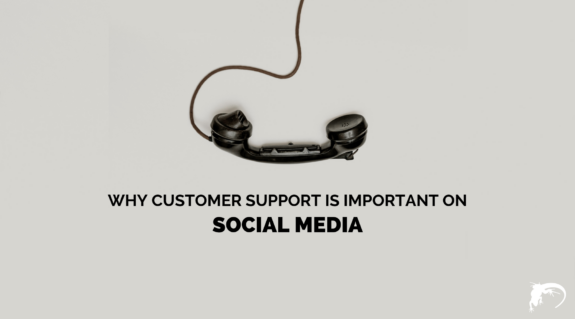Why Customer Support is Important on Social Media

People are tired of being ignored by businesses and when it comes to social media platforms, they are ready to let everyone know about it. As a full-service digital agency, we regularly inform clients why customer support is important on social media and wanted to share those thoughts to help ensure that businesses are maximizing the use of social platforms rather than causing irreparable harm to their brand’s image.
Many businesses struggle with the idea of being social on social media. What does “being social” even mean? Where are the boundaries and what does “being social” look like?
The Social aspect of Social Media
A primary idea of social media is that it is an electronic communication method used for social networking. Online communities are created where people can share information, ideas, and the like. Most people know the origin story of Facebook and other social media pioneers such as MySpace. The idea was to connect people online.
When businesses entered the fray, the goal was to leverage social media to help enhance their business and ultimately sales. That is the primary problem, and frustration, from the consumer standpoint. Businesses are simply using social media as another promotional outlet whereas people by-in-large expect and use it as a two-way communication channel.
On average brands send out 20 promotional messages for every 1 customer response message.
In this regard, many businesses are completely missing the social aspect of social media and people are not only getting fed up with it but are now voicing that outrage. The simple fact is that without a social interaction aspect, it just becomes media.
The People’s Choice
The popularity and inclusion of social media in the average consumer’s daily life have naturally resulted in social media platforms becoming the primary option for customer care and complaints. While some consumers still utilize phone calls and email contact, most of the customer contact now takes place on websites and social media platforms.
Additionally, because of this evolution, we have experienced in becoming the “now” generation, the expectations are higher than ever for responses on social media channels.
While social media has become the people’s choice for contact and support, it isn’t viewed in the same manner by businesses, which is a mistake. It costs 1/6 the amount to solve a customer issue on social media platform compared to a call center. That money saved along with increased customer satisfaction translates directly to increased revenue and brand reputation.
According to a consumer survey by Sprout Social 36% of people have used social media to shame a company for poor customer service and 30% said they will go to a competitor if a brand does not respond on a social channel.
Tips for better Customer Support on Social Media
- Monitor Social Media mentions – Depending on your business size and structure, staring at social media accounts all day might not be a feasible option. Luckily there are quite a few great tools available, both free and subscription-based, that can track and alert you when mentions take place. Social Mention is a top free option while HootSuite is a popular paid option. Make sure to set up searches for the business name, products, Social Media handles, as well as spelling and misspelling variations.
- Avoid scripted automation – Some businesses have experimented with automated scripted replies to messages. An auto-reply is never the response a customer is looking for when they have a problem or question. Automation does have a place is both marketing and customer service but should be used with as much personalization as possible.
- Post benchmark response times and stick to them – There should be an expectation set for both the business and the customer when using a platform for customer support. By determining what reasonable response times should be and then posting them it sets the expectation for the customer of when they can expect a response by, which can limit frustration when they do not instantly receive a response. This is an area automation could be used combined with personalization to respond to a customer concern letting them know it has been received and to expect a reply within X hours. Almost half of social media users expect to get a response within 60 minutes of contact, so while answering promptly is important, so is setting the expectation prior to – or at the time of the inquiry.
- Be personable – Social media interactions by a business should strive to be both personable and professional. The goal should be to interact, increase customer satisfaction, and leave a good impression about the brand which is most easily accomplished by taking the time to be personable and friendly with customers. Be mindful of the tone being used and make sure it is on-brand and welcoming.
- Don’t take it personally – Social media has become a landscape filled with negativity, trolls, and autonomy. It can be very easy to fall into the trap of engaging in negative interactions and arguments with people online, some of whom are simply trying to create conflict. Avoid that trap! Numerous businesses have caused irreparable harm to their brand by arguing with customers on social media and review sites. Even when correct, by making it personal and responding in kind it lowers the value of your brand in many people’s eyes.
- Provide proper training – Social media customer service is different than face-to-face, or phone interactions and proper training should be provided to ensure that employees understand the expectations, best practices, and goals for customer support. That should include detailed training on the social media platform(s), messenger services and the like.
- Take it offline as needed – Not all interactions need to stay on social media. In some cases, switching to e-mail or a phone call can result in quicker, more complete problem resolution. This should also be done to keep customer data private and secure online. Remember to not just pass off a customer to someone else, but instead using the same friendly tone to re-direct the conversation to another more private platform.
The Bottom Line
The bottom line is that customer support is important on social media because more and more customers are using those platforms to connect with brands. By ignoring this fact or providing subpar support, a brand risks not only losing customers to competitors but also a loss in reputation due to irritated customers using social media to vent their frustrations.
Be sure to check back every week for great new Lounge Lizard blog articles.





